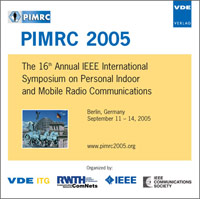Adaptive Subcarrier Block Modulation with Differentially Modulated Pilot Symbol Assistance for Downlink OFDM Using Uplink Delay Spread
Conference: PIMRC 2005 - 16th Annual IEEE International Symposium on Personal Indoor and Mobile Radio Communications
09/11/2005 - 09/14/2005 at Berlin, Germany
Proceedings: PIMRC 2005
Pages: 5Language: englishTyp: PDF
Personal VDE Members are entitled to a 10% discount on this title
Authors:
Ahn, Chang-Jun; Takahashi, Satoshi; Harada, Hiroshi (National Institute of Information and Communications Technology (NICT), 3-4 Hikarino-oka, Yokosuka, 239-0847, Japan)
Abstract:
In an AMS/OFDM system, base station is in control of the modulation level of each subcarrier, and then, adaptive modulated packet is transmitted from the base station to the mobile station. In this case, the mobile station is required the modulation level information (MLI) to demodulate the received packet. The MLI is generally transmitted as a data symbol, therefore, the throughput is degraded. In an OFDM, the channel response at a particular subcarrier frequency is not supposed to be totally different from its neighboring frequencies, and hence, they must have correlation which depends on the coherence bandwidth of the channel Bc. If we could assign the same modulation level for coherently faded subcarrier block, MLI is required only one time for each subcarrier block. Moreover, we can assign the data on the empty space of pilot signals for increasing the total transmission. In this paper, we propose an adaptive subcarrier block modulation with differentially modulated pilot symbol assistance for downlink OFDM using uplink delay spread.


